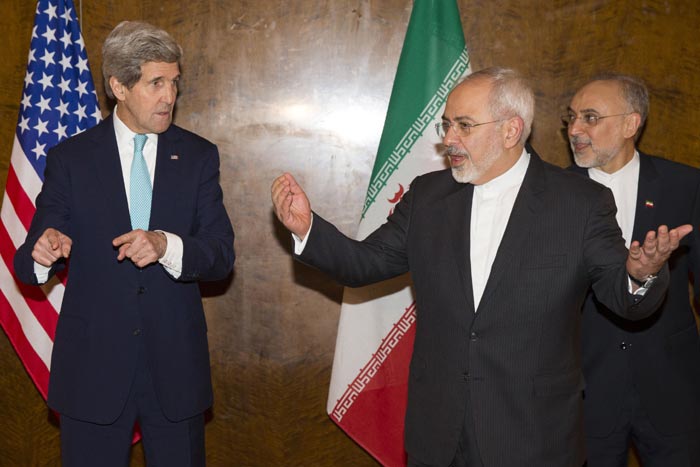US Secretary of State John Kerry with Iranian Foreign Minister Mohammad Javad Zarif ahead of a new round of nuclear negotiations in Montreux.
AFP/Montreux
Iran and the US on Tuesday returned to the negotiating table for a second day of talks, as a political storm over the issue unfolded thousands of miles away in Washington.
By the shores of Lake Geneva in the town of Montreux, US Secretary of State John Kerry met with his Iranian counterpart Mohammad Javad Zarif as they try to pin down a political framework for a deal to rein in Tehran's nuclear programme by a March 31 deadline.
US officials said they began their talks at 9.33 am (0833 GMT).
After months of discussions, the two men launched this latest round of talks on Monday, and are due to continue negotiating until Wednesday afternoon, when Kerry will fly to Riyadh to meet King Salman.
Few details of the emerging deal have publicly come to light so far, but aides to Israeli Prime Minister Benjamin Netanyahu have threatened that may change when the Israeli leader makes a controversial address to the US Congress later on Tuesday.
Kerry and his staff have warned Netanyahu against betraying US trust by revealing classified briefings about the course of the negotiations.
Netanyahu's lobbying trip to Washington is seen as a last-ditch bid to derail one of the last key goals of President Barack Obama's foreign policy.
But the US insists that a deal forged through diplomacy would be the best way to ensure Iran does not acquire a nuclear bomb.
Olive branch
Although cold-shouldered by the administration, Netanyahu has offered an olive branch, saying he meant no disrespect to Obama by accepting an invitation to address US lawmakers that was orchestrated by the president's rival Republicans, Reuters adds from Washington.
As many as one-fifth of Democratic members plan to sit out the speech to protest what they see as a politicisation of Israeli security, an issue on which Congress usually unites.
The White House is wary of Netanyahu using the forum to lay bare the closed-door negotiations designed to curb Iran's nuclear drive.
Obama on Monday appeared to wave off any prospect the bedrock US alliance with Israel might be ruined by the rancour.
"I don't think it's permanently destructive," Obama told Reuters in an interview. "I think that it is a distraction from what should be our focus. And our focus should be, 'How do we stop Iran from getting a nuclear weapon?'"
Netanyahu, who has played up his security credentials ahead of a closely contested March 17 election in Israel, has denied his speech would have any design other than national survival.
"I plan to speak about an Iranian regime that is threatening to destroy Israel," he told the pro-Israel US lobby AIPAC on Monday. "The last thing that I would want is for Israel to become a partisan issue, and I regret that some people have misperceived my visit here this week as doing that."

